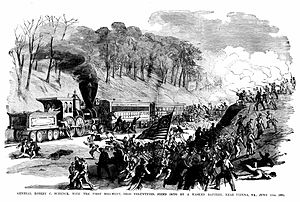38°54′03″N 77°15′23″W / 38.9008351°N 77.2564224°W
| Battle of Vienna, Virginia | |||||||
|---|---|---|---|---|---|---|---|
| Part of the American Civil War | |||||||
 1st Ohio Infantry in action at Vienna, Virginia June 17, 1861 | |||||||
| |||||||
| Belligerents | |||||||
|
|
| ||||||
| Commanders and leaders | |||||||
|
Irvin McDowell Robert C. Schenck |
P. G. T. Beauregard Maxcy Gregg | ||||||
| Strength | |||||||
| 274 | 750 | ||||||
| Casualties and losses | |||||||
|
8 killed 4 wounded | None | ||||||
The Battle of Vienna, Virginia was a minor engagement between Union and Confederate forces on June 17, 1861, during the early days of the American Civil War.
The Union was trying to protect the areas of Virginia opposite Washington, D.C., and established a camp at Vienna, at the end of a 15-mile (24.1 km) railroad to Alexandria. As Union Brig. Gen. Robert C. Schenck was transporting the 1st Ohio Infantry to Vienna by train, they were overheard by Confederate scouts led by Colonel Maxcy Gregg, who set up an ambush. They hit the train with two cannon shots, inflicting casualties of eight killed and four wounded, before the Union men escaped into the woods. The engineer had fled with the locomotive, so the Union force had to retreat on foot. The Confederates briefly attempted a pursuit in the dark, but it was called off.
Compared with later operations, the battle involved only small numbers, with the Union fielding 274 infantry, and the Confederates about 750 of infantry, cavalry and artillery. But it was widely reported by an eager press, and it worried the government, whose 90-day regiments were due to be disbanded.